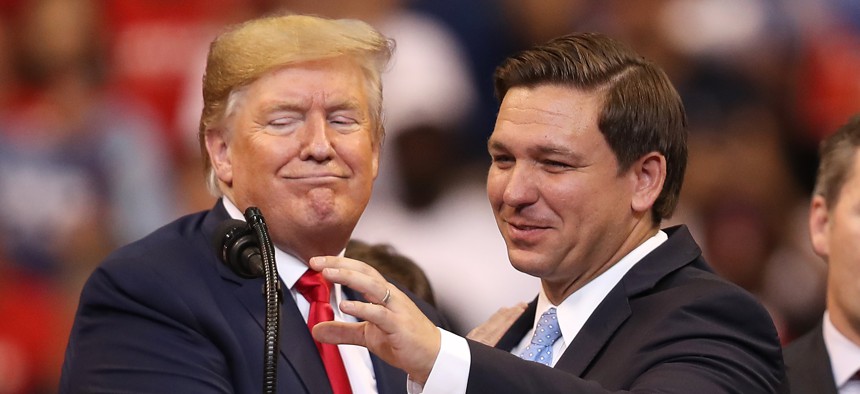Policy
DeSantis vs. Trump: How their policy positions will stack up in a 2024 face-off
The two political figures hold the same positions across many issues, but where they differ could make a difference in a race for the White House.

U.S. President Donald Trump introduces Florida Governor Ron DeSantis during a homecoming campaign rally at the BB&T Center on November 26, 2019 in Sunrise, Florida. Photo by Joe Raedle/Getty Images
Ed. Note — With news that Gov. DeSantis could announce as early as today that he is running for the Republican presidential nomination in 2024, this is an updated version of an analysis that originally ran last September.
ANALYSIS | The founding father of Trumpism and its most astute disciple are on an inevitable collision course. They agree on many political issues, but where they have drawn lines in the sand could have a significant effect on their 2024 Republican primary matchup.
Former President Donald Trump and Florida Gov. Ron DeSantis are leading in the polls as top contenders for the White House in 2024, meaning it's likely one of them will be the Republican nominee.
Thrust into state prominence after receiving Trump’s endorsement and into the national spotlight over his first term as governor, DeSantis’ policy focus in the Sunshine State has shown streaks of Trumpism, the political ideology of America’s 45th President, often defined as “an anti-establishment blend of economic populism, reactionary nationalism and strong militarism.”
DeSantis, however, has pushed further in many cases in a seeming attempt to run to the right of Trump on issues important to the Republican base, while holding others that might make him more appealing to independent voters. That hasn’t yet cut into Trump’s commanding polling lead among his party.
These are the issues you can expect the two Republican titans to fight about on the campaign trail.
Immigration
When Donald Trump decided in 2015 to run for president, immigration was his first red-meat issue, with his quest to build a wall on the United States-Mexico border.
In the White House, he sought to stem immigration, both legal and undocumented. His support of legislation like the RAISE act cut the number of legal immigrants into the country by half. He also implemented a policy, just now being phased out, that required asylum seekers to stay in Mexico while their cases were processed. And he also championed budget increases for Immigration and Customs Enforcement (ICE).
DeSantis has backed stricter enforcement of federal immigration law in the state and enforcing stricter state laws on undocumented immigrants and the companies that employ them.
Under a law passed this legislative session, Florida employers with more than 25 employees are required to check their immigration status using a federal database known as E-Verify, and could face fines of $1,000 per day until they provide proof that their workers are legal citizens.
In previous years, he supported legislation mandating law enforcement agencies in Florida that oversee county detention facilities to work with ICE to enforce immigration laws.
DeSantis also signed a bill that bars Florida government agencies from doing business with transportation companies that bring undocumented immigrants to the state. This month, he sent the Florida National Guard to Texas to assist in protecting the border.
LGBTQ issues
It took one measure pushed by DeSantis – the Parental Rights in Education law – to antagonize his LGBTQ critics so much that they dubbed the measure “Don’t Say Gay,” a nickname that continues to polarize Florida politics.
He pushed that bill even further to other issues affecting the LGBTQ community, including prohibitions on drag performances, banning gender-affirming care for minors, and expanding the reach of the parental rights law.
DeSantis’ policy pursuits have served as an agenda-setter for Republican-controlled legislatures across the country.
Trump had his own controversies when it came to LGTBQ policies, as when he banned trans people from serving in the military. But his administration did not prioritize those moves the way DeSantis has.
Trump’s administration also made an international push for the decriminalization of homosexuality in countries where it’s illegal, but his statements about it suggest it wasn’t a priority for him.
The former president has included the similar anti-trans rhetoric that has grown in popularity in his party into his public statements as he prepares to run against DeSantis.
Foreign policy
Trump marked a significant shift in the GOP’s foreign policy priorities, favoring an non-interventionist approach.
The former president helped cut the deal with the Taliban to pull out of Afghanistan, which in part was carried out by President Joe Biden to end the longest war in American history.
DeSantis criticized Biden for how the withdrawal took place, but said that he thought it was time for the conflict to be over.
DeSantis and Trump have both made controversial statements about the War in Ukraine.
While DeSantis publicly applauded Ukraine’s soldiers and criticized Russian President Vladimir Putin, he took flak from members of his party for calling the war a “territorial dispute.”
Trump, who has not said whether he supports either side in the war, suggested that Ukraine should have struck a deal with Putin and given up some of their territory or agreed not to join NATO to avoid the war. He also called Putin’s framing of his military strategy “genius” and “very savvy.”
Energy and the environment
The two Republicans both have resisted using the term “global warming,” but their philosophy and actions taken involving the environment and energy are different.
Trump’s administration rolled back over 100 environmental regulations during his presidency. He pulled the U.S. out of the international Paris climate agreement. He pushed for increased domestic fossil fuel production, approving controversial projects like the Keystone XL pipeline while not supporting renewable energy.
DeSantis has argued that the term “global warming” has been used as a pretext for unnecessary left-wing policies, but his administration has sided with environmentalists on some issues.
He approved $276 million in 2021 to help combat sea level rise. And he vetoed a bill promoted by Florida Power & Light that would have removed “net metering,” billing that credits solar energy system owners for the electricity they add to the grid. That earned him praise from solar advocates.
He has also staunchly supported Everglades protection, which netted him an endorsement from the Everglades Trust during his run for reelection in 2022.
Abortion
Trump, who supported abortion rights before he entered politics, is the person the anti-abortion movement can thank the most for the overturning of Roe v. Wade earlier this summer.
His three appointments to the U.S. Supreme Court were in the majority that overturned the landmark decision, meaning Trump led to the quashing of national abortion protections that anti-abortion activists have long been hoping for.
But he criticized DeSantis’ abortion position after the governor recently signed a six-week abortion ban into law. Some pro-life activists have backed up DeSantis against Trump’s criticism.
Marijuana
While he has said he leans in opposition to legalizing recreational marijuana in Florida, citing issues he claimed arose in other states and its smell, the first bill DeSantis signed in office was a repeal of the state’s ban on smokeable medical cannabis.
That saw him align with John Morgan, the well-known lawyer and medical marijuana advocate who backed Andrew Gillum for governor, and GOP U.S. Rep. Matt Gaetz, who was an early supporter of medicinal pot when he was in the Florida House.
Trump is not a pot ally. As a candidate in 2016, he said of medical marijuana, “I’m in favor of it a hundred percent,” and said states should be allowed to determine whether to legalize it for adult use.
But his administration angled to remove medical marijuana protections nationally (and failed). His campaign doubled down that it should remain illegal at the federal level. A leaked recording also caught Trump saying smoking weed makes people dumber.
This policy difference might boost DeSantis: 91% of Americans support marijuana legalization for either medical or recreational use, according to Pew Research.
Education
Both politicians’ education policies and priorities are similar, but DeSantis pushed even further than Trump.
Near the end of his presidency, Trump targeted “woke” education initiatives and commissioned a report from his 1776 Commission, which embarked on a patriotic telling of American history to counter the New York Times’ 1619 Project.
The commission’s report was heavily criticized by historians, but its goal of changing what is taught in classrooms was unmistakable.
DeSantis has seen that goal through in Florida. Aside from the parental rights law and its follow-up, the passage of his “Stop WOKE” act similarly has influenced what can be discussed in classrooms, already affecting what books may be allowed in school libraries. Stories of books being pulled from shelves across the state have garnered national attention.
Aside from that policy, he successfully threw his weight behind school board races in the state, which will likely affect how those laws are implemented in several school districts across the state.
Both men also are supporters of school choice, with Trump filling his education department with school choice supporters like former U.S. Secretary of Education Betsy DeVos, and DeSantis recently signing legislation to make school choice universal in Florida.
Gun control
DeSantis and Trump both have opposed assault weapon bans and stronger background checks, but passed key measures after receiving public pressure following deadly mass shootings.
While Trump rolled back some gun regulations starting in the early days of his presidency, his administration also banned bump stocks after the 2017 Las Vegas shooting that killed 58 people.
DeSantis came into office shortly after his predecessor, Rick Scott, signed Florida’s red flag law following the 2018 mass shooting at Parkland’s Marjory Stoneman Douglas High School.
DeSantis has previously supported that policy, now also being championed by the Biden administration. But DeSantis is against further gun control legislation, and even championed a bill that removed the requirement of a permit to carry a concealed firearm in Florida.
Health care
Trump’s main contribution to health care policy was repeatedly trying to repeal or weaken former President Barack Obama’s Affordable Care Act. He cut subsidies for the program, created off-ramps for other insurances and disincentivized legal non-citizen residents from participating in Medicaid programs.
Since becoming governor, DeSantis has worked to block Medicaid expansion in Florida, limiting initiatives promoted by Biden, Obama’s former vice president. Part of the $1.9 trillion stimulus plan championed by the Biden administration during the pandemic included money to encourage dozens of states to expand Medicaid coverage.
DeSantis has firmly resisted that expansion in Florida and turned down the dollars. His administration also backed new limits on what Medicaid can cover, including what’s called “gender-affirming care” for transgender youth.
Taxes and spending
Through the early 2000s and during the two terms of the Obama administration, Republicans criticized the additions to the national debt and rising budget deficits. That issue, however, has become less prominent in political discourse in recent years.
Trump’s presidency played a role in that. The national debt rose by almost $7.8 trillion during Trump’s time in office, the third largest increase ever and in only four years.
The increase in budget deficit that led to the fast-rising debt could be attributed to reduced revenue from his tax cuts and from the COVID-19 pandemic, as well as increased spending.
While Trump piled on debt, DeSantis oversaw a record budget surplus in Florida during the last fiscal year, assisted by an influx of federal funds due to the pandemic.
He cut $3.1 billion from this year’s multi-billion dollar state budget, including projects championed by some of his allies. In next year’s budget that he is yet to sign, there is projected to be another budget surplus even before he line-item vetoes anything.
DeSantis also backed a sweeping tax package this year that offered tax relief in several areas, including diapers.
Contact Tristan Wood at twood@cityandstatefl.com and follow him on Twitter: @TristanDWood
NEXT STORY: Broward School Board picks seven semifinalists in superintendent search
